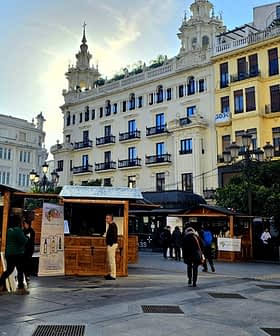Algerian Runner Abed El-Hachemi Wins 7th Olive Tree Marathon in Sfax
El-Hachemi finished first again with a 2:44 finish at the 2019 Marathon of the Olive Trees.
As the official olive picking season opened in Tunisia’s southern city of Sfax, runners from across Tunisia and neighboring Algeria took their marks for the country’s seventh Marathon of the Olive Trees on Sunday.
Algerian athlete Abed El-Hachemi who crossed the finish line in two hours and 44 minutes secured his second consecutive victory and received 1,000 Tunisian Dinars ($354) in prize money. He completed the course around six minutes slower than in 2018.
The crowds had quite a wait before Franco/Tunisian Philippe Houssin came in second after three hours and 39 minutes followed in third place by Sfaxian runner Salim Bejaoui.
In the women’s marathon, Tunisia’s Mahbouba Belgacem was first to cross the finish line after running for four hours and 17 minutes. Silver and bronze medals also went to Tunisian women; Syrine Mejri came in second and Rania Houas was third across the line.
Algeria also excelled in the men’s half marathon where Housseyn Halloufi won and pocketed 600 Tunisian dinars ($212), while fellow Algerian Hassen Halloufi came in second and Tunisia’s Khalil Soltani was the third runner home.
Tunisian women dominated the half marathon when Chefia Hendaoui won gold, Leila Annabi secured silver and Algeria’s Lynda Hamiane came in third.
The star of the 10 km run was 85-year-old Mohamed Kazdaghli, who finished the race in just over an hour beating many of his younger competitors although he was pipped to the post by Algeria’s Ali Rekhrou who won the race. Tunisian runner Abdelrahim Zhoui took silver and Fares Debaya, also from Tunisia, won bronze.
Gold, silver and bronze medals for the women’s 10 km run went to Tunisian runners Chahira Barghouthi, Rawya Triki and Maryem Benkrayem.
Competitors were motivated to participate in the olive tree marathon by a variety of goals. Wajdi Crif Damak, an anesthetist at a clinic in Sfax, ran the half marathon with a banner declaring “One Tunisia — One Goal.” He told Olive Oil Times his dream was a united Tunisia with people from across the country pulling together for a brighter future.
Aymen Ghorbel who ran the 10 km race told us he had competed in preparation for the forthcoming Tunis Marathon and Karim Boughzala told us it was the third time he had participated in the 10 km run along with friends purely “for the fun of it.”
Naamen Bouhamed launched the first Marathon of the Olive trees in 2012 and aspired to grow sports tourism in Tunisia with a world-class sporting event attended by elite athletes and international runners.

Despite a new, faster course, the 2019 Marathon struggled to attract elite competitors and international runners with fewer participants in both categories than in the 2016 race which welcomed participants from the UK, France, Germany, Hungary, Ethiopia and Morocco.
The constantly smiling and ever-enthusiastic Bouhamed spoke of the challenges he had faced, namely difficulties securing visas, bureaucracy and a lack of support from the authorities.
Bouhamed remained optimistic about realizing his vision of attracting more tourists to the historically-rich city of Sfax (which has applied for UNESCO heritage status) along with other areas in the south of Tunisia which remain largely unexplored by tourists who generally converge in the coastal resorts of Sousse and Hammamet.
Hundreds of youngsters from Sfax and the surrounding areas including the island of Kerkennah, assembled at the city’s ancient Medina for a 3‑km “Fun Run” held the afternoon before the marathon. The festivities continued into the evening with a display of Sfaxian culture and traditional live music.
The aptly named Marathon of the Olive Trees takes place in Tunisia’s largest olive-growing region which produces around 80 percent of the country’s olive oil.
Our reporter noted that the olive trees were laden with plump fruit which appeared to support an earlier prediction from The Tunisian Ministry of Agriculture that olive oil production in the North African country could reach 350,000 tons this season, making Tunisia once again the world’s second-largest producer.
In October, Tunisia’s presidential race was won by Kais Saied, a 61-year-old law professor. Saied secured around 72 percent of the electoral vote while his main opponent Nabil Karoui, a jailed media mogul who faced accusations of corruption and money laundering, trailed behind with support from just 27 percent of the electorate.








